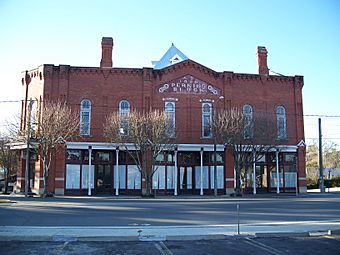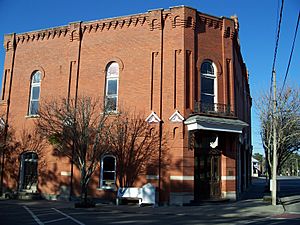Perkins Opera House facts for kids
Quick facts for kids |
|
|
Perkins Opera House
|
|
 |
|
| Location | Monticello, Florida |
|---|---|
| Built | 1890 |
| Architectural style | Masonry Vernacular with Romanesque Revival elements |
| NRHP reference No. | 72000330 |
| Added to NRHP | September 14, 1972 |
The Perkins Opera House is a very old and special theater in Monticello, Florida, United States. It is also known as the Monticello Opera House. You can find it at the corner of Washington Street and Jefferson Street.
Contents
A Look Back: The Opera House's Story
How the Opera House Began
The building was named the Perkins Block Building after a Monticello businessman named John H. Perkins. Back then, new railroads were bringing many travelers through Monticello. The town wanted to build hotels and fun places to visit to attract these tourists.
John Perkins was given a special deal: he got a ten-year tax break if he built a place with shops and a theater. An architect named W. R. Gunn from Chattanooga designed the building. It was finished in 1890.
What Was Inside?
The first floor of the building had three large sections for Perkins' businesses. There was a general store, a sewing machine shop, a hardware store, and a farm supply store. Behind the building, Perkins also built a stable where horses, mules, and wagons were sold.
The second floor was very grand! It had a big entrance area and the opera house itself. This theater was famous for its amazing sound quality, called acoustics. It also had the biggest stage in the whole region.
Early Shows and Challenges
John Perkins hoped his opera house would become a major theater in the southern United States. For several years, many different shows were performed there. These included professional traveling groups and local vaudeville acts. Some famous plays like The Mikado and She Stoops to Conquer were performed.
However, things changed after the year 1900. The railroads were moved, and they no longer passed through Monticello. Wealthy visitors who used to spend their winters in north Florida started going to places further south. This meant fewer people came to the opera house, and it began to lose money.
The Theater Falls Quiet
Because it was hard to attract popular theater shows, Perkins stopped having live performances. One of the last shows featured LeRoy Collins, who later became the Governor of Florida. There was an attempt to use the building as a movie theater, but it didn't work out. The main theater area was then left empty and started to fall apart.
Even though the shops downstairs were still used for different things, the opera house upstairs became quiet and needed many repairs.
Saving the Opera House
In 1972, a group of people had a great idea to save the opera house. It was in bad shape with falling plaster and a leaky roof. They wanted to stop it from being torn down. An organization was created to help young performers and fix up the opera house.
The Monticello Opera Company was formed in March 1972. They held their first event to raise money at the home of Mr. and Mrs. John H. Phipps.
The group officially bought the Perkins Block building on October 17, 1973. They used money from fundraising, a grant from the State of Florida, and a private gift from Mrs. Dorothy Simpson.
Ongoing Repairs and Upgrades
Even today, the building is still being cared for and restored. The Monticello Opera House worked with the Florida Department of State to fix the original stairway leading to the balcony. This work made the building safer and allowed people to use the balcony seats again. They tried to keep the original look of the building, using old molding and wood where they could.
The seats on the main level of the theater had to be replaced. New seats were given by the president of Tallahassee Community College when their own theater was being renovated. Volunteers from the community helped install all the "new" seats.
The downstairs area was made accessible for people with disabilities earlier. But it wasn't until May 2004 that the theater itself became accessible. In 1999, $25,000 was donated in memory of Dr. Gerald M. Cathey to start raising money for an elevator. Another $25,000 was raised over the next two years through donations and money from shows. A $50,000 matching grant from the Department of State helped hire a construction company to install the elevator.
What Happens There Today?
The Monticello Opera House is a busy place now! It hosts many different events. You can see children's theater shows, fun murder mystery dinners, and big musicals. The patio and gazebo behind the building are also used for weddings and parties.
 | Ernest Everett Just |
 | Mary Jackson |
 | Emmett Chappelle |
 | Marie Maynard Daly |


